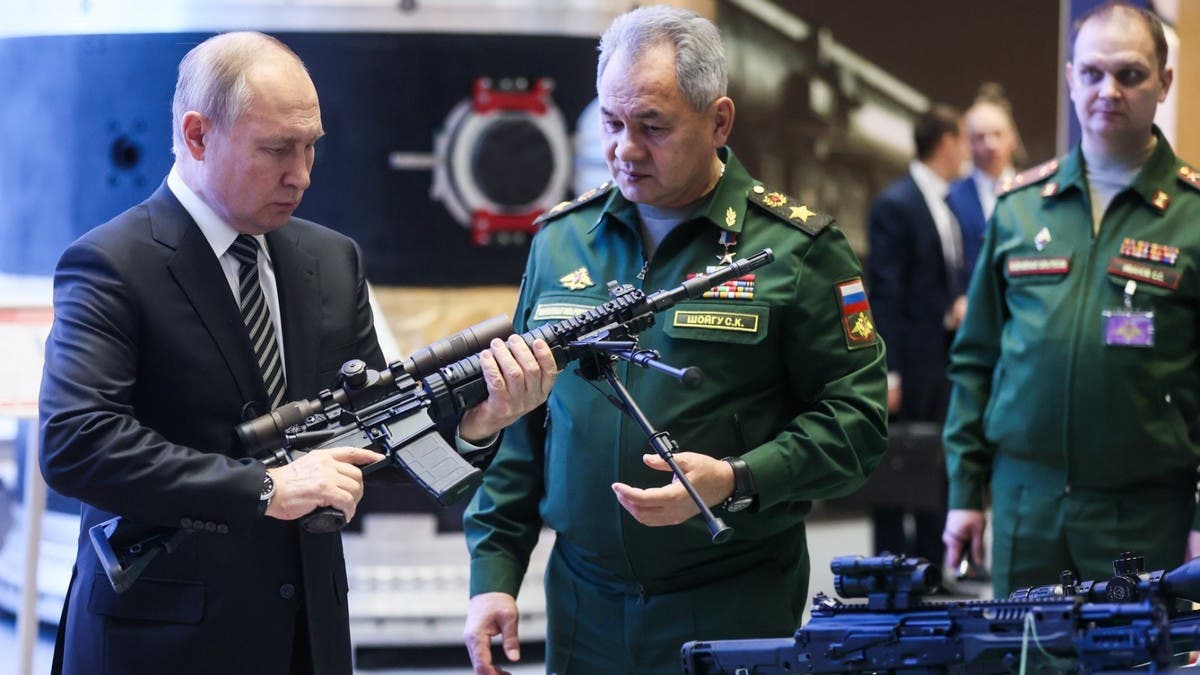The European Union agreed to slap sanctions Wednesday on Russia's defense minister, a top adviser to President Vladimir Putin and hundreds of Russian lawmakers who voted in favor of recognizing the independence of separatist areas in southeast Ukraine.
The sanctions, mostly a freeze on the assets of those listed and a ban on them traveling in the 27-nation EU, are the first steps in a planned series of retaliatory measures designed to be ramped up should Putin launch an attack or push troops deeper into Ukraine. They are expected to take effect later Wednesday.
Putin signed a decree recognizing Donetsk and Luhansk as independent and appears to be driving Russia's campaign against Ukraine, but he is not on the EU’s list even though the sanctions target those “ involved in the illegal decision.”
Russian Defense Minister Sergei Shoigu and Putin's chief of staff, Anton Vaino, were among the high-profile officials targeted, according to a list of sanctions seen by The Associated Press.
For the latest headlines, follow our Google News channel online or via the app.
The EU said under Shoigu’s “command and orders, Russian troops have held military drills in the illegally annexed Crimea and have been positioned at the border. He is ultimately responsible for any military action against Ukraine.”
Vaino was said to play “an active role in Kremlin decision-making process by taking part in the Russian ‘Security Council’ and influencing the elaboration of decisions by the president in the field of Russia’s defense and national security.”
The Commander-in-Chief of the Russian Navy, Nikolay Yevmenov, is also on the list, as are foreign ministry spokeswoman Maria Zakharova and RT editor-in-chief Margarita Simonyan — who are both referred to as “a central figure of the government propaganda.”
“The EU will extend restrictive measures to cover all the 351 members of the Russian State Duma, who voted on 15 February in favor of the appeal to President Putin to recognize the independence of the self-proclaimed Donetsk and Luhansk ‘republics’,” EU headquarters said.
The measures also hit banks that finance Russia's armed forces. They target the ability of Moscow to access EU capital and financial markets and services, and ban EU trade with the two regions so that “those responsible clearly feel the economic consequences of their illegal and aggressive actions.”
EU foreign policy chief Josep Borrell has said the sanctions “will hurt Russia and it will hurt a lot.”
But Pyotr Tolstoy, the deputy chairman of the State Duma lower house of parliament who was one of the Russians hit by the sanctions, laughed them off and warned that Russia would retaliate with its own measures.
“Every time they implement sanctions against Russia, it does not make any sense and it’s worthless,” Tolstoy told Belgian broadcaster RTBF on Wednesday. “Actually, we don’t give a damn about these sanctions.”
“It gives the impression that the authorities in Brussels are doing something," he said. "In fact, they are doing nothing.”
The measures come on top of a raft of economic and other sanctions slapped on Russia since it annexed Ukraine’s Crimean Peninsula in 2014, including steps to force Moscow to comply with the 2015 Minsk peace deal, which ended major hostilities in eastern Ukraine but now appears to be overtaken by events.
Those sanctions already targeted Russia’s financial, energy and defense sectors, as well as goods that can be used for both civilian and military purposes.
More than 190 people and almost 50 “entities,” which are organizations, agencies, banks or companies, had also been separately targeted by the bloc for “actively supporting actions and implementing policies that undermine or threaten the territorial integrity, sovereignty and independence of Ukraine.”
More than 14,000 people have been killed since 2014 in fighting between Ukrainian troops and Russian-backed separatists in eastern Ukraine.
Read more:
Russia vows ‘strong’ response to US ‘ineffective’ sanctions over Ukraine actions
EU unanimously agree new sanctions that will ‘hurt’ Russia: France
Parliament grants Putin request to use Russia’s military to back Ukraine separatists

 World3 years ago
World3 years ago
 World3 years ago
World3 years ago
 Business11 months ago
Business11 months ago
 Entertainment7 years ago
Entertainment7 years ago
 World7 years ago
World7 years ago
 Entertainment7 years ago
Entertainment7 years ago






